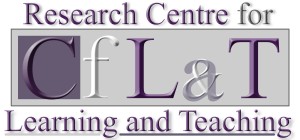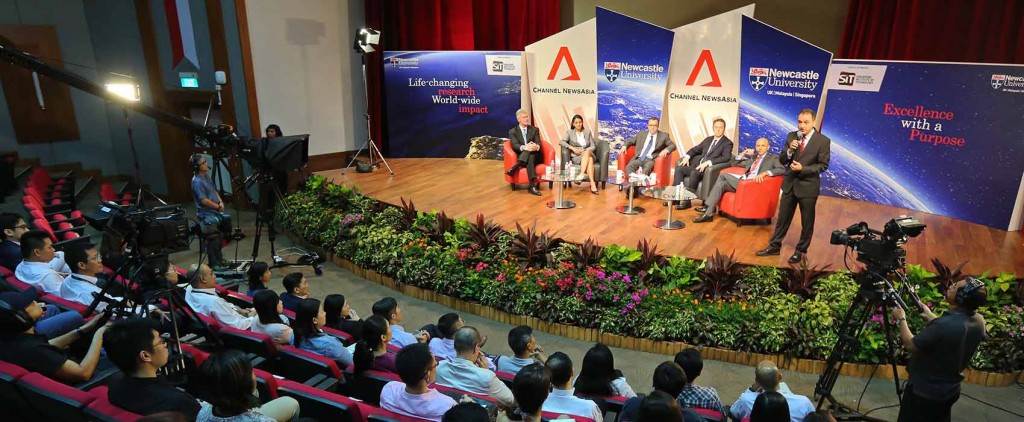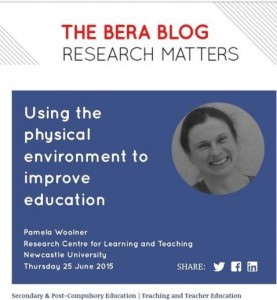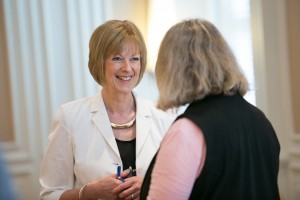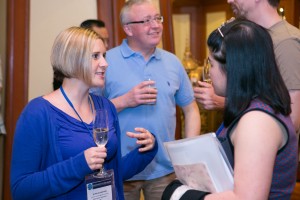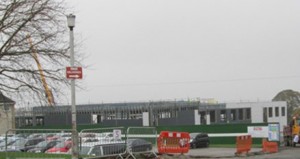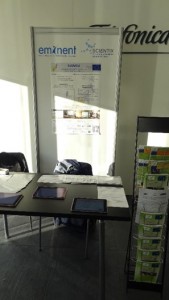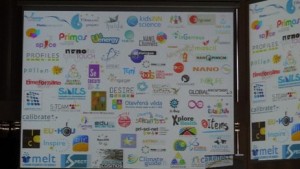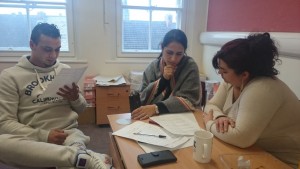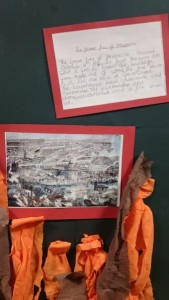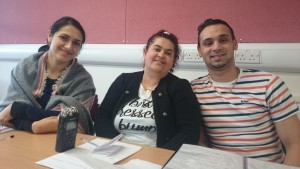CfLaT Headlines
Robin Humphrey has been awarded a Principal Fellowship of the UK Higher Education Acade-my for his work on Doctoral Research Training, becoming the fourth Principal Fellow in the University and joining a group of just over 400 in the higher education sector.
Congratulations to Jill Clark on the award of her PhD. Her thesis is entitled: The Journey of re-searching on to researching with –theoretical and methodological challenges within educational research . Dr Clark will formally graduate in the summer ceremony.
Pam Woolner and Lucy Tiplady have a chapter in a German edited collection. The chapter, about change through the Open Futures programme, is in English, but there is a German abstract—thanks to CfLaT colleagues Ulrike Thomas and Alina Schartner!
Following the success of the LTHE programme for Kazakh academics, Anna Reid has received an invitation to work as a visiting professor at the Khoja Akhmet Yassawi International Kazakh-Turkish University in April 2016.
Paula Cardellino, an architecture academic from Uruguay, will be visiting CfLaT in February and March. She will be doing a Research Tea (24 Feb) and a seminar (3 March).
DAVID LEAT DEBATES THE FUTURE OF LEARNING
In December David Leat travelled to Singapore for a three day visit to appear in a TV panel discussion on the Future of Learning, transmitted by Channel NewsAsia in January.
This was part of a series to help develop the profile of Newcastle University in Singapore, as the university runs six under-graduate programs there, in a partnership with Singapore Institute of Technology. Here are David’s reflections on the experience:
Can you summarise what you think is important in a context in 3 or 4 sentences, in a way that an alert lay audience can make sense of.? In your head you have endless arguments, examples, complex concepts, favourite bits of research, jibes etc. But can you form that into a coherent message that an audience member can hook into? You can judge for yourself how I did, if you watch the recording: http://www.channelnewsasia.com/tv/tvshows/perspectives/episode/episode-18-the-future-of/2425136.html
I experienced two media formats, a panel discussion with four other panelists, and series of magazine interviews. The second is far more comfortable as you get a chance to elaborate and develop points in successive questions. In the panel format, you are in competition with the other panelists, partly for air time and partly in arguing your case. There are many skills to be deployed: catching the eye of the moderator, waiting for a tiny lull in someone else’s flow and getting in, connecting to what has been said by others, in agreement, disagreement or in terms of causation. And, above all, making the audience laugh. After the first section of the programme, the assistant floor manager whizzed up to me and asked me to ‘pull my socks up’. I thought I had done OK so far. But it transpired that this was a literal not a metaphorical request as we were in lounge chairs and I was exposing a bit of skin be-tween sock and trousers. Note to self – long socks next time.
BLOGGING FOR BRITAIN
CfLaT research is gaining a new audience through our contributions to the British Educational Research Association’s new multi-authored blog.
In its first six months blog posts by Rachel Lofthouse and David Leat were each in the top ten read list. Other CfLaT contributors include Pam Woolner, Simon Gibbs, Alina Schartner and Anna Reid. Why not take a look at https://www.bera.ac.uk/blog?
And if you fancy contributing a blog post do get in touch with Rachel.Lofthouse@ncl.ac.uk as she is one of the BERA blog editors.
DELIVERING FAMILY SERVICES IN SCHOOL SETTINGS: THE CASE OF M-PACT+
Karen Laing has recently completed some research working alongside colleagues at Mentor UK that evaluated M-PACT+ (Moving Parents and Children Together). M-PACT+ is an intervention devised by Action on Addiction who are now working with Place2Be to offer help through schools for families struggling with the effects of substance abuse.
M-PACT+ is being offered in four areas of the country (including the North East). The evaluation was commissioned by Comic Relief and the Royal Foundation of The Duke and Duchess of Cambridge and Prince Harry. 47 families received support between 2013 and 2015.
The evaluation found that the benefits for children included improved family communication and family functioning, being better able to cope with challenges and having a better understanding about how addiction affects families. Children told us that they felt more confident, had been able to develop strategies for keeping themselves safe and felt less isolated following their involvement with M-PACT+:
“People your [own] age – like probably other people’s parents have got the same ad-dictions as your parents so it means you can bond with them and they understand. It wasn’t just happening in our family.”
The delivery of M-PACT was accompanied by training opportunities for school and Place2Be staff to develop their understanding of hidden harm and how M-PACT could help children affected by parental substance misuse. The training was highly regarded and staff reported gains in knowledge and understanding. However, some school and Place2Be staff continued to report that they lacked confidence in their ability to identify and support families who might benefit from M-PACT. Staff emphasised that confidence and trust are key to engaging parents and carers in conversations about parental sub-stance misuse and participating in M-PACT. Developing this trust can take time.
The evaluation also found that M-PACT is more likely to be integrated with a school’s support for families where the school and Place2Be staff routinely share appropriate information about pupils and where schools already offer a range of services for pupils and parents. In these schools there are clear procedures for discussing concerns about the needs of children and about who is best placed to speak to parents about M-PACT. Parents valued the support that was offered, and told us about the benefits they had found from attending:
“I felt I could voice my concerns and opinions and people would listen without interrupting and being judgemental. There were people there to listen and they understood. It felt like someone cared for you, for what your feelings and thoughts were…..especially when you have come off drugs.”
“Communication has improved. It seems like such an easy task – it should be automatic and it’s extremely difficult – we are all different personalities. It has helped me to tone down the shouting. It was a major breakthrough for me.”
Dissemination events and briefings on the findings from the evaluation are currently being prepared.
For further information, please contact Karen Laing k.j.c.laing@ncl.ac.uk
Internationalisation of Higher Education
Sue Robson has just returned from Bangkok where, with Newcastle colleagues, she delivered a workshop for 28 early career researchers from UK and Thai universities on ‘Internationalisation of higher education: developing values-based inter-cultural research approaches’. The workshop enabled early-career re-searchers from across disciplines to meet peers with similar research interests with the aim of developing research joint proposals for future funding. CfLaT’s Alina Schartner was one of the participants.
Feedback from participants was very positive and special thanks go to Dr Navaporn Snodin from Kasetsart University for the superb venue she organised for the work-shop. We look forward to further developing the links that have been made with Thai universities.
For further information, please contact sue.robson@newcastle.ac.uk
SCHOOL REBUILD RESEARCH GETS THE GO-AHEAD
Pam Woolner and Ulrike Thomas are about to start work on an exciting project following the changes at a local school currently being rebuilt.
Although new school spaces can be raise morale and be catalysts for other change, there is no guarantee of long term benefits. As we all know, change can be hard! With CfLaT colleagues, Karen Laing and Anna Reid, Pam and Ulrike will work with the school community to understand their experiences of the existing building and their expectations of the new. They are interested in student attitudes, before and after the rebuild, and the views of the non-teaching staff—the administration, technical and sup-port staff who sometimes get forgotten. As well as revealing more about the impact of changing the educational environment, the project will enable members of the school community to discuss and develop their views of the old and new premises. This should assist the school to maximise the advantages and minimise the stresses of their move. Financial support from the university has been provided for this project and to develop work in this area.
For further information, please contact pamela.woolner@ncl.ac.uk
Marie Butterworth 2015 Prize awarded to Sara Wood
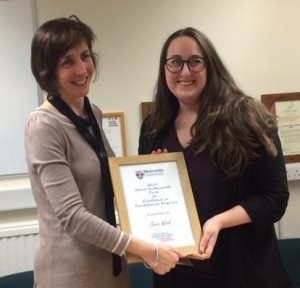
Every year we present the Marie Butterworth Prize for Excellence in Practitioner Enquiry to a student who has completed one of our M.Ed in Practitioner Enquiry programmes. Marie was a keen advocate of teacher research, an active participant in a number of ECLS research projects, a CfLaT re-search fellow and a local deputy head teacher. ECLS makes this award in her memory to celebrate her enthusiasm and achievements.
We were pleased to present this award to Sara Wood this year, who recently completed her dissertation entitled ‘Fifty Shades of Independent Reading’. Sara’s enquiry focused on developing a curriculum based approach to encourage and enable greater participation and enjoyment in independent reading at Key Stage 3.
Sara discussed her approach and findings at a CfLaT research tea where we welcomed Steve Jones, Marie’s husband, to share in the event. He acknowledged the award stating “It’s a very touching – and appropriate – gesture to help keep Marie’s memory alive and to, in a sense, allow her work to continue.” In relation to Sara’s work he added “It’s encouraging to know that there are still people out there who don’t see data-crunching as the be-all and end-all of education.”
The last word should go to Sara, who wrote, “I just want to thank you again for the wonderful recognition of this award and the opportunity to talk about my research. It really was an absolute pleasure – please pass on my thanks to all who attended. Their interest and thoughtful questions were particularly gratifying. It’s a delight to be able to share my research in such depth to such an esteemed group – it has let me re-engage with the successes and findings of this research as well as inspiring me to further this work.”
FaSMed update: The FaSMEd project is progressing well and is now two years in!
After receiving the Scientix Resource Award for The Prototype Toolkit, Scientix invited two members of FaSMEd to represent the project at EMINENT 2015 – STEM IN EDUCA-TION AND LIFE. This is the Experts Meeting in Education Networking annual event by European Schoolnet. This year it was held from 19-20 November in Barcelona and was organized in cooperation with Scientix and the Department of Edu-cation of Catalonia.
EMINENT 2015 brought together 280 participants from 37 countries including ministries representatives, policy-makers, researchers, STEM teachers and other stakeholders.
In February, two members of the FaSMEd project team – Jill Clark and David Wright – will be travelling to Cape Town in South Africa for our consortium meeting. During their visit they will be visiting some of the schools that our South African partners have been working with, discussing the analysis of our interventions and case studies across all our partner countries and presenting our latest version of the web-based toolkit.
For further information, please contact Jill.Clark@ncl.ac.uk
An update on ROMtels (Roma translanguaging enquiry learning space)
ROMtels is an Erasmus+ funded project based at Newcastle University, with partners in Finland, France and Romania as well as Middlesex University and a local Newcastle school. The Newcastle team is Heather Smith and Lydia Wysocki.
Our aim is to effect practice changes in the inclusion and education of Traveller pupils across Europe and in particular Roma pupils, who continue to suffer overt racism, discrimination and social exclusion. We aim to achieve this by sup-porting teachers in enabling pupils to use their home languages for learning in school. The project begins with Roma and Eastern European Traveller pupils, but will create resources open to many different languages.
We start this quest in Newcastle by using an innovative blend of technologies to create an interactive multilingual enquiry-based learning space (see http://research.ncl.ac.uk/romtels/ for more details). Children undertaking the enquiries — for example learning about the Great Fire of Tyneside 1854 — will hear characters, who come to life on the walls of the interactive space, speaking in their home language(s) and English. Children will be encouraged to speak to each other in whichever languages they need to undertake the enquiry. We began by identifying the various Ro-ma languages of the communities attending our partner school, Arthur’s Hill Federation. We worked with the school’s Slovak/Czech community worker, Zaneta, who is herself of Roma heritage. After several meetings and quite a bit of detective work utilising an amazing linguistic resource developed by Manchester University (http://romani.humanities.manchester.ac.uk/), we identified two distinct languages in a group of 10 families. Nine families appeared to share what is named in the Manchester database as East Slovak Roma whilst one family spoke a Slovak form of Kalderash. Given the number of families speaking East Slovak Roma, we began translations with this form of Roma.
From the families we met, two parents (from different families) agreed to help us: Marta and Laco, who has had to give up several days work to do this!
The translanguation, as we are calling the process of translating from English to Czech/Slovak to a translanguaged form of East Slovak Roma/Slovak, has required remarkable attention to detail. But all involved have learned a great deal. We cannot wait to see the parents and children‘s faces next month when the space and technology are finally completed. For further information, contact Heather.Smith@ncl.ac.uk
RESEARCH TEA TIMETABLE Spring 2016
Research teas aim to provide an informal forum for discursive examination of emerging research themes and concepts. This term the programme includes an eclectic mix of speakers – details below, or from the Centre website: http://www.ncl.ac.uk/cflat/news/Teas.htm
Tea and cakes will be available from 3.45pm in the Centre base (2.50 KGVI) with the session running from 4-5pm.
Wednesday 17th February Vidya Sarangapani, Open Lab:
Virtual. Cultural.Collaboration: Mobile Technologies, Migrant Communities and Multicultural Learning.
Wednesday 24th February Paula Cardellino, Visiting Academic, Uruguay: An architectural perspective on educational challenges – The Uruguayan experience
Wednesday 16th March Theresa Thornton, Northumberland College: Can changing the approach to CPD encourage Teacher Agency and develop Communities of Practice?
Wednesday 6th April Research Methodology Poster Tea: Room 1.71, KGVI.
For further information on CfLaT research teas and/or if you are interest-ed in discussing some of your own research at a tea please contact Laura.MazzoliSmith@ncl.ac.uk
For further information:
Research Centre for Learning and Teaching
School of Education, Communication and Language Sciences
King George VI Building
Newcastle University
Newcastle upon Tyne
NE1 7RU
clt@ncl.ac.uk
www.ncl.ac.uk/cflat/

